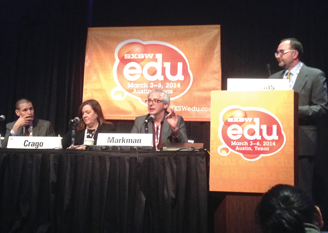Isaac Barchasis the director of the Austin Technology Incubator, which helps early-stage technology companies to develop in order to get an initial round of funding from investors. From that perch, you might imagine that he sees science, technology, engineering and mathematics (the STEM disciplines) as the core of economic growth in Austin. And, to be sure, he does realize that these disciplines matter a lot.

But when he analyzes the reasons why new ventures fail, he points out that problems with the technology or engineering are rarely the cause of a company’s demise. Sometimes, it is just bad luck. A competitor comes in and snatches away an opportunity before the startup can get its product off the ground. But more often the problem comes down to people. Perhaps the company founder cannot recognize that he or she needs to give up some control to a person with more business experience. Or the founding team does not communicate effectively. Or the company misestimates the target market for the product. Or the company fails to tell its story in a compelling way.
The skills needed to solve these problems are not STEM-based skills. Some of them are specific professional skills—a company needs to know how to ask for financing and to spend money wisely—but many solutions require people skills.
And that is where the liberal arts come in.
The liberal arts are all about people. We study the way individuals act, how groups pass information and how cultures maintain behaviors. We explore the philosophy underlying ethical behavior. We tease apart the principles of effective communication and develop ways to understand what people are not telling you.
The program in the Human Dimensions of Organizations was created with the recognition that many people in the world of business, nonprofits, government and the military would benefit from a deeper exposure to the liberal arts. Our first class of HDO master’s students—representing a variety of backgrounds—has come together to delve into the disciplines that will improve their abilities to lead people and organizations.
In particular, the liberal arts provide today’s leaders with a valuable perspective on modern problems. There is a tendency to assume that the difficulties we face in the 21st century are unique—unlike anything seen before in history. For our HDO students, this notion is quickly dispelled. Paul Woodruff, former dean of undergraduate studies and Darrell K. Royal Regents Professor in Ethics and American Society, taught a class in leadership to our master’s students. His background is in the classics, so many of his assigned texts are ancient.
His students quickly learned that despite today’s technological advances, the “people problems” facing modern business are fundamentally similar to issues that society has grappled with for centuries. It is the benefit of this perspective that helps students draw on thousands of years of analysis from across many cultures in dealing with the issues of the here and now.
There are many reasons to study the liberal arts. There is great joy in being a well-rounded individual. There is profound wisdom to be gathered from studying the world’s cultures. There is a deep appreciation of individual differences to be garnered by exploring the incredible diversity of human expression.
If your reasons also include a solid return on a workplace investment, you will find that the liberal arts is a vast repository of solutions to some of our most pressing problems, a body of knowledge and a way of thinking that is crucial for success both today and in the long term.
Art Markman is the Annabel Irion Worsham Centennial Professor of Psychology and Marketing and founding director of the Human Dimensions of Organizations program. His most recent book is Smart Change: Five Tools to Create Sustainable Habits in Yourself and Others (Perigee).
